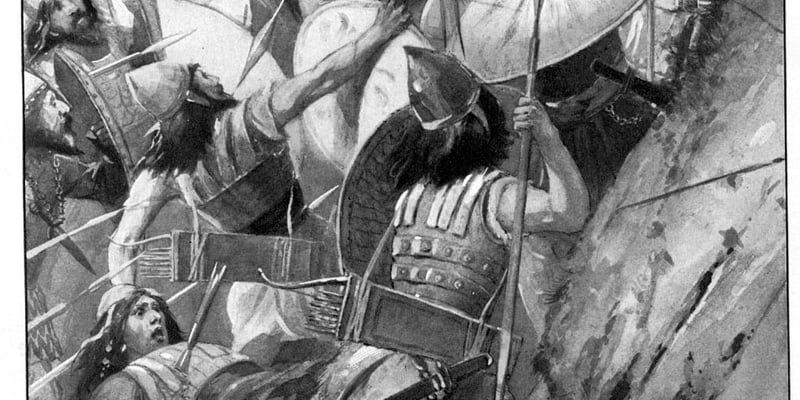War for the World
Written by Joshua Travers
 H.G. Wells wrote about a “War of the Worlds” between mankind and Martians. But some believe the Bible refers to a “War for the World” between two groups of far more powerful beings.
H.G. Wells wrote about a “War of the Worlds” between mankind and Martians. But some believe the Bible refers to a “War for the World” between two groups of far more powerful beings.
It took me more than a month, but I finally did it—I finally finished Niall Ferguson’s book The War of the World: Twentieth-Century Conflict and the Descent of the West. If college life was not so busy, I would have finished it much earlier. I found the reading to be very interesting and was excited to finish it. Throughout the course of the book Mr. Ferguson showed some of the causes of the two World Wars and offered some insight about the many resulting wars.
Ironically enough, the month that I was reading this book was the month that led up to the Feast of Trumpets—the day that celebrates the final victory of powerful forces for good over the present global selfishly motivated evil powers.
Another war
The basic premise of Mr. Ferguson’s book is that the two conflicts we know as World War I and II were actually part of a larger conflict that lasted 50 years and was, in fact, a war of the world (hence his book title). As a college student majoring in history education, I found the book and many of its ideas simply fascinating.
The book did have some limitations, though. While it talked about the many incredible things that happened in that 50-year period, it never mentioned the vital players behind the scenes. It also failed to mention that this 50-year “War of the World” resulted from a 6,000-year system of voluntary captivity that will soon end with a “War for the World.”
War on earth
In the popular movie series Transformers, aliens come from outer space and make earth their new battleground. While there is nothing in reality that is quite like the robots from the movie, there are strange beings involved in controlling the systems of power on earth.
In Daniel 10:12-13 we are given some insight into this struggle to maintain control on earth. Daniel had been seeking to understand something that had been bothering him. A man “clothed in linen” came after three weeks to reveal to him what he was seeking. In explaining the delay, the angel said that the prince of the kingdom of Persia had withstood him for 21 days.
From the language of the passage, you come away with the impression that there was a battle to prevent God’s messenger from reaching one of His faithful servants. It talks about the king of Persia and hints at much larger conflicts behind powers that influence other nations. Ultimately, the stakes will be control of the entire world.
The origins of war
War has fascinated mankind for ages. Yet most researchers overlook a vital aspect of war—the very first war. It wasn’t between two groups of Neanderthals with sticks and stones, as some would have us think. Rather, it was between an angelic being named Lucifer and the all-powerful God of the universe.
In Revelation 12 we read about this conflict that predates humanity. Satan, formerly an angel called Lucifer, led a third of the angels astray and started a rebellion against God Himself. We don’t know many of the details about this very first war. We do know that it was massive—apparently massive enough to leave the earth wasted and chaotic (Genesis 1:2).
It all started when Lucifer became prideful and began to believe that he could rule better than God could. The details of his fall are revealed in Isaiah 14 and Ezekiel 28. Revelation 12 reveals that Satan and his demons actually fight with the righteous angels.
The purpose of this war
Satan wants to maintain control of the world, which Jesus Christ agreed he has (Matthew 4:8-10). That will change, however, when Christ returns as King of Kings and Lord of Lords (Revelation 19:15-16). Yet what exactly do we mean by the term world? Is this just about control of a small planet in an enormous universe?
Planet earth is not what Satan’s struggle is over. The term world has the same meaning in John 3:16: “For God so loved the world that He gave His only begotten Son, that whoever believes in Him should not perish but have everlasting life.” We know without a doubt that Christ was not sacrificed for the planet.
Who, or what, did Christ die for? The Bible answers this question multiple times. In Romans 5:8 Paul writes, “Christ died for us.” Christ died for us—me, you, Uncle Fred, Aunt May and everyone else in the world! God gave His only begotten Son for us! God helps Christians overcome Satan so we may prepare to rule the world with Christ when He returns. We overcome Satan today by using the power of God’s Spirit given to us by God to resist Satan’s influence (James 4:7-8). When Christ returns, Satan will be removed to free the earth from his control (Revelation 20:1-3).
In 1 Timothy 2:4 Paul tells Timothy that God “desires all men to be saved.” God will free His creation from Satan’s captivity, and He doesn’t want to lose a single one of us to the deceiver’s tactics!
God cast Satan to this earth long ago (Luke 10:18); and in reality, there is no contest. The war for the hearts of men and women only appears to be won by Satan. In God’s plan for redemption, the majority of mankind will eventually reject Satan’s concepts of selfish power; but we must decide to side with God in this spiritual war and to resist Satan. The war against Satan has been going on for thousands of years for God’s people, but the end is coming closer with every passing day. We must be ready when that day comes and Jesus Christ replaces Satan as ruler of this earth and we rule with Him.
For more on this battle and its sure outcome, see “God vs. Satan.”
Joshua Travers is a college freshman double majoring in Spanish and integrated social studies education at Ohio University. He attends the Athens, Ohio, congregation of the Church of God, a Worldwide Association.










